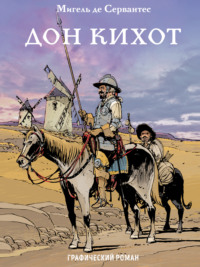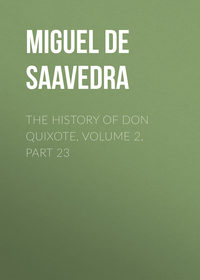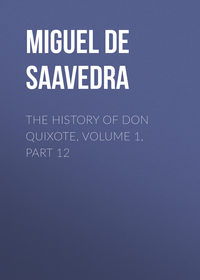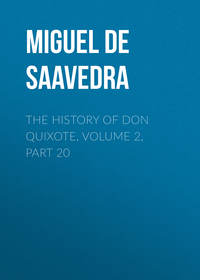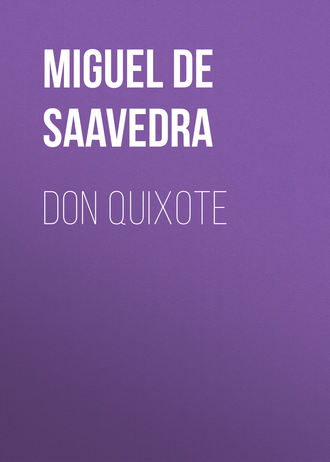 полная версия
полная версияDon Quixote
At this point they became aware of a harsh indistinct noise that seemed to spread through all the valleys around. Don Quixote stood up and laid his hand upon his sword, and Sancho ensconced himself under Dapple and put the bundle of armour on one side of him and the ass's pack-saddle on the other, in fear and trembling as great as Don Quixote's perturbation. Each instant the noise increased and came nearer to the two terrified men, or at least to one, for as to the other, his courage is known to all. The fact of the matter was that some men were taking above six hundred pigs to sell at a fair, and were on their way with them at that hour, and so great was the noise they made and their grunting and blowing, that they deafened the ears of Don Quixote and Sancho Panza, and they could not make out what it was. The wide-spread grunting drove came on in a surging mass, and without showing any respect for Don Quixote's dignity or Sancho's, passed right over the pair of them, demolishing Sancho's entrenchments, and not only upsetting Don Quixote but sweeping Rocinante off his feet into the bargain; and what with the trampling and the grunting, and the pace at which the unclean beasts went, pack-saddle, armour, Dapple and Rocinante were left scattered on the ground and Sancho and Don Quixote at their wits' end.
Sancho got up as well as he could and begged his master to give him his sword, saying he wanted to kill half a dozen of those dirty unmannerly pigs, for he had by this time found out that that was what they were.
"Let them be, my friend," said Don Quixote; "this insult is the penalty of my sin; and it is the righteous chastisement of heaven that jackals should devour a vanquished knight, and wasps sting him and pigs trample him under foot."
"I suppose it is the chastisement of heaven, too," said Sancho, "that flies should prick the squires of vanquished knights, and lice eat them, and hunger assail them. If we squires were the sons of the knights we serve, or their very near relations, it would be no wonder if the penalty of their misdeeds overtook us, even to the fourth generation. But what have the Panzas to do with the Quixotes? Well, well, let's lie down again and sleep out what little of the night there's left, and God will send us dawn and we shall be all right."
"Sleep thou, Sancho," returned Don Quixote, "for thou wast born to sleep as I was born to watch; and during the time it now wants of dawn I will give a loose rein to my thoughts, and seek a vent for them in a little madrigal which, unknown to thee, I composed in my head last night."
"I should think," said Sancho, "that the thoughts that allow one to make verses cannot be of great consequence; let your worship string verses as much as you like and I'll sleep as much as I can;" and forthwith, taking the space of ground he required, he muffled himself up and fell into a sound sleep, undisturbed by bond, debt, or trouble of any sort. Don Quixote, propped up against the trunk of a beech or a cork tree – for Cide Hamete does not specify what kind of tree it was – sang in this strain to the accompaniment of his own sighs:
When in my mindI muse, O Love, upon thy cruelty, To death I flee,In hope therein the end of all to find.But drawing nearThat welcome haven in my sea of woe, Such joy I know,That life revives, and still I linger here.Thus life doth slay,And death again to life restoreth me; Strange destiny,That deals with life and death as with a play!He accompanied each verse with many sighs and not a few tears, just like one whose heart was pierced with grief at his defeat and his separation from Dulcinea.
And now daylight came, and the sun smote Sancho on the eyes with his beams. He awoke, roused himself up, shook himself and stretched his lazy limbs, and seeing the havoc the pigs had made with his stores he cursed the drove, and more besides. Then the pair resumed their journey, and as evening closed in they saw coming towards them some ten men on horseback and four or five on foot. Don Quixote's heart beat quick and Sancho's quailed with fear, for the persons approaching them carried lances and bucklers, and were in very warlike guise. Don Quixote turned to Sancho and said, "If I could make use of my weapons, and my promise had not tied my hands, I would count this host that comes against us but cakes and fancy bread; but perhaps it may prove something different from what we apprehend." The men on horseback now came up, and raising their lances surrounded Don Quixote in silence, and pointed them at his back and breast, menacing him with death. One of those on foot, putting his finger to his lips as a sign to him to be silent, seized Rocinante's bridle and drew him out of the road, and the others driving Sancho and Dapple before them, and all maintaining a strange silence, followed in the steps of the one who led Don Quixote. The latter two or three times attempted to ask where they were taking him to and what they wanted, but the instant he began to open his lips they threatened to close them with the points of their lances; and Sancho fared the same way, for the moment he seemed about to speak one of those on foot punched him with a goad, and Dapple likewise, as if he too wanted to talk. Night set in, they quickened their pace, and the fears of the two prisoners grew greater, especially as they heard themselves assailed with – "Get on, ye Troglodytes;" "Silence, ye barbarians;" "March, ye cannibals;" "No murmuring, ye Scythians;" "Don't open your eyes, ye murderous Polyphemes, ye blood-thirsty lions," and suchlike names with which their captors harassed the ears of the wretched master and man. Sancho went along saying to himself, "We, tortolites, barbers, animals! I don't like those names at all; 'it's in a bad wind our corn is being winnowed;' 'misfortune comes upon us all at once like sticks on a dog,' and God grant it may be no worse than them that this unlucky adventure has in store for us."
Don Quixote rode completely dazed, unable with the aid of all his wits to make out what could be the meaning of these abusive names they called them, and the only conclusion he could arrive at was that there was no good to be hoped for and much evil to be feared. And now, about an hour after midnight, they reached a castle which Don Quixote saw at once was the duke's, where they had been but a short time before. "God bless me!" said he, as he recognised the mansion, "what does this mean? It is all courtesy and politeness in this house; but with the vanquished good turns into evil, and evil into worse."
They entered the chief court of the castle and found it prepared and fitted up in a style that added to their amazement and doubled their fears, as will be seen in the following chapter.
CHAPTER LXIX.
OF THE STRANGEST AND MOST EXTRAORDINARY ADVENTURE THAT BEFELL DON QUIXOTE IN THE WHOLE COURSE OF THIS GREAT HISTORY
The horsemen dismounted, and, together with the men on foot, without a moment's delay taking up Sancho and Don Quixote bodily, they carried them into the court, all round which near a hundred torches fixed in sockets were burning, besides above five hundred lamps in the corridors, so that in spite of the night, which was somewhat dark, the want of daylight could not be perceived. In the middle of the court was a catafalque, raised about two yards above the ground and covered completely by an immense canopy of black velvet, and on the steps all round it white wax tapers burned in more than a hundred silver candlesticks. Upon the catafalque was seen the dead body of a damsel so lovely that by her beauty she made death itself look beautiful. She lay with her head resting upon a cushion of brocade and crowned with a garland of sweet-smelling flowers of divers sorts, her hands crossed upon her bosom, and between them a branch of yellow palm of victory. On one side of the court was erected a stage, where upon two chairs were seated two persons who from having crowns on their heads and sceptres in their hands appeared to be kings of some sort, whether real or mock ones. By the side of this stage, which was reached by steps, were two other chairs on which the men carrying the prisoners seated Don Quixote and Sancho, all in silence, and by signs giving them to understand that they too were to be silent; which, however, they would have been without any signs, for their amazement at all they saw held them tongue-tied. And now two persons of distinction, who were at once recognised by Don Quixote as his hosts the duke and duchess, ascended the stage attended by a numerous suite, and seated themselves on two gorgeous chairs close to the two kings, as they seemed to be. Who would not have been amazed at this? Nor was this all, for Don Quixote had perceived that the dead body on the catafalque was that of the fair Altisidora. As the duke and duchess mounted the stage Don Quixote and Sancho rose and made them a profound obeisance, which they returned by bowing their heads slightly. At this moment an official crossed over, and approaching Sancho threw over him a robe of black buckram painted all over with flames of fire, and taking off his cap put upon his head a mitre such as those undergoing the sentence of the Holy Office wear; and whispered in his ear that he must not open his lips, or they would put a gag upon him, or take his life. Sancho surveyed himself from head to foot and saw himself all ablaze with flames; but as they did not burn him, he did not care two farthings for them. He took off the mitre, and seeing it painted with devils he put it on again, saying to himself, "Well, so far those don't burn me nor do these carry me off." Don Quixote surveyed him too, and though fear had got the better of his faculties, he could not help smiling to see the figure Sancho presented. And now from underneath the catafalque, so it seemed, there rose a low sweet sound of flutes, which, coming unbroken by human voice (for there silence itself kept silence), had a soft and languishing effect. Then, beside the pillow of what seemed to be the dead body, suddenly appeared a fair youth in a Roman habit, who, to the accompaniment of a harp which he himself played, sang in a sweet and clear voice these two stanzas:
While fair Altisidora, who the sport Of cold Don Quixote's cruelty hath been,Returns to life, and in this magic court The dames in sables come to grace the scene,And while her matrons all in seemly sort My lady robes in baize and bombazine,Her beauty and her sorrows will I singWith defter quill than touched the Thracian string.But not in life alone, methinks, to me Belongs the office; Lady, when my tongueIs cold in death, believe me, unto thee My voice shall raise its tributary song.My soul, from this strait prison-house set free, As o'er the Stygian lake it floats along,Thy praises singing still shall hold its way,And make the waters of oblivion stay.At this point one of the two that looked like kings exclaimed, "Enough, enough, divine singer! It would be an endless task to put before us now the death and the charms of the peerless Altisidora, not dead as the ignorant world imagines, but living in the voice of fame and in the penance which Sancho Panza, here present, has to undergo to restore her to the long-lost light. Do thou, therefore, O Rhadamanthus, who sittest in judgment with me in the murky caverns of Dis, as thou knowest all that the inscrutable fates have decreed touching the resuscitation of this damsel, announce and declare it at once, that the happiness we look forward to from her restoration be no longer deferred."
No sooner had Minos the fellow judge of Rhadamanthus said this, than Rhadamanthus rising up said:
"Ho, officials of this house, high and low, great and small, make haste hither one and all, and print on Sancho's face four-and-twenty smacks, and give him twelve pinches and six pin thrusts in the back and arms; for upon this ceremony depends the restoration of Altisidora."
On hearing this Sancho broke silence and cried out, "By all that's good, I'll as soon let my face be smacked or handled as turn Moor. Body o' me! What has handling my face got to do with the resurrection of this damsel? 'The old woman took kindly to the blits; they enchant Dulcinea, and whip me in order to disenchant her; Altisidora dies of ailments God was pleased to send her, and to bring her to life again they must give me four-and-twenty smacks, and prick holes in my body with pins, and raise weals on my arms with pinches! Try those jokes on a brother-in-law; 'I'm an old dog, and "tus, tus" is no use with me.'"
"Thou shalt die," said Rhadamanthus in a loud voice; "relent, thou tiger; humble thyself, proud Nimrod; suffer and be silent, for no impossibilities are asked of thee; it is not for thee to inquire into the difficulties in this matter; smacked thou must be, pricked thou shalt see thyself, and with pinches thou must be made to howl. Ho, I say, officials, obey my orders; or by the word of an honest man, ye shall see what ye were born for."
At this some six duennas, advancing across the court, made their appearance in procession, one after the other, four of them with spectacles, and all with their right hands uplifted, showing four fingers of wrist to make their hands look longer, as is the fashion now-a-days. No sooner had Sancho caught sight of them than, bellowing like a bull, he exclaimed, "I might let myself be handled by all the world; but allow duennas to touch me – not a bit of it! Scratch my face, as my master was served in this very castle; run me through the body with burnished daggers; pinch my arms with red-hot pincers; I'll bear all in patience to serve these gentlefolk; but I won't let duennas touch me, though the devil should carry me off!"
Here Don Quixote, too, broke silence, saying to Sancho, "Have patience, my son, and gratify these noble persons, and give all thanks to heaven that it has infused such virtue into thy person, that by its sufferings thou canst disenchant the enchanted and restore to life the dead."
The duennas were now close to Sancho, and he, having become more tractable and reasonable, settling himself well in his chair presented his face and beard to the first, who delivered him a smack very stoutly laid on, and then made him a low curtsey.
"Less politeness and less paint, senora duenna," said Sancho; "by God your hands smell of vinegar-wash."
In fine, all the duennas smacked him and several others of the household pinched him; but what he could not stand was being pricked by the pins; and so, apparently out of patience, he started up out of his chair, and seizing a lighted torch that stood near him fell upon the duennas and the whole set of his tormentors, exclaiming, "Begone, ye ministers of hell; I'm not made of brass not to feel such out-of-the-way tortures."
At this instant Altisidora, who probably was tired of having been so long lying on her back, turned on her side; seeing which the bystanders cried out almost with one voice, "Altisidora is alive! Altisidora lives!"
Rhadamanthus bade Sancho put away his wrath, as the object they had in view was now attained. When Don Quixote saw Altisidora move, he went on his knees to Sancho saying to him, "Now is the time, son of my bowels, not to call thee my squire, for thee to give thyself some of those lashes thou art bound to lay on for the disenchantment of Dulcinea. Now, I say, is the time when the virtue that is in thee is ripe, and endowed with efficacy to work the good that is looked for from thee."
To which Sancho made answer, "That's trick upon trick, I think, and not honey upon pancakes; a nice thing it would be for a whipping to come now, on the top of pinches, smacks, and pin-proddings! You had better take a big stone and tie it round my neck, and pitch me into a well; I should not mind it much, if I'm to be always made the cow of the wedding for the cure of other people's ailments. Leave me alone; or else by God I'll fling the whole thing to the dogs, let come what may."
Altisidora had by this time sat up on the catafalque, and as she did so the clarions sounded, accompanied by the flutes, and the voices of all present exclaiming, "Long life to Altisidora! long life to Altisidora!" The duke and duchess and the kings Minos and Rhadamanthus stood up, and all, together with Don Quixote and Sancho, advanced to receive her and take her down from the catafalque; and she, making as though she were recovering from a swoon, bowed her head to the duke and duchess and to the kings, and looking sideways at Don Quixote, said to him, "God forgive thee, insensible knight, for through thy cruelty I have been, to me it seems, more than a thousand years in the other world; and to thee, the most compassionate upon earth, I render thanks for the life I am now in possession of. From this day forth, friend Sancho, count as thine six smocks of mine which I bestow upon thee, to make as many shirts for thyself, and if they are not all quite whole, at any rate they are all clean."
Sancho kissed her hands in gratitude, kneeling, and with the mitre in his hand. The duke bade them take it from him, and give him back his cap and doublet and remove the flaming robe. Sancho begged the duke to let them leave him the robe and mitre; as he wanted to take them home for a token and memento of that unexampled adventure. The duchess said they must leave them with him; for he knew already what a great friend of his she was. The duke then gave orders that the court should be cleared, and that all should retire to their chambers, and that Don Quixote and Sancho should be conducted to their old quarters.
CHAPTER LXX.
WHICH FOLLOWS SIXTY-NINE AND DEALS WITH MATTERS INDISPENSABLE FOR THE CLEAR COMPREHENSION OF THIS HISTORY
Sancho slept that night in a cot in the same chamber with Don Quixote, a thing he would have gladly excused if he could for he knew very well that with questions and answers his master would not let him sleep, and he was in no humour for talking much, as he still felt the pain of his late martyrdom, which interfered with his freedom of speech; and it would have been more to his taste to sleep in a hovel alone, than in that luxurious chamber in company. And so well founded did his apprehension prove, and so correct was his anticipation, that scarcely had his master got into bed when he said, "What dost thou think of tonight's adventure, Sancho? Great and mighty is the power of cold-hearted scorn, for thou with thine own eyes hast seen Altisidora slain, not by arrows, nor by the sword, nor by any warlike weapon, nor by deadly poisons, but by the thought of the sternness and scorn with which I have always treated her."
"She might have died and welcome," said Sancho, "when she pleased and how she pleased; and she might have left me alone, for I never made her fall in love or scorned her. I don't know nor can I imagine how the recovery of Altisidora, a damsel more fanciful than wise, can have, as I have said before, anything to do with the sufferings of Sancho Panza. Now I begin to see plainly and clearly that there are enchanters and enchanted people in the world; and may God deliver me from them, since I can't deliver myself; and so I beg of your worship to let me sleep and not ask me any more questions, unless you want me to throw myself out of the window."
"Sleep, Sancho my friend," said Don Quixote, "if the pinprodding and pinches thou hast received and the smacks administered to thee will let thee."
"No pain came up to the insult of the smacks," said Sancho, "for the simple reason that it was duennas, confound them, that gave them to me; but once more I entreat your worship to let me sleep, for sleep is relief from misery to those who are miserable when awake."
"Be it so, and God be with thee," said Don Quixote.
They fell asleep, both of them, and Cide Hamete, the author of this great history, took this opportunity to record and relate what it was that induced the duke and duchess to get up the elaborate plot that has been described. The bachelor Samson Carrasco, he says, not forgetting how he as the Knight of the Mirrors had been vanquished and overthrown by Don Quixote, which defeat and overthrow upset all his plans, resolved to try his hand again, hoping for better luck than he had before; and so, having learned where Don Quixote was from the page who brought the letter and present to Sancho's wife, Teresa Panza, he got himself new armour and another horse, and put a white moon upon his shield, and to carry his arms he had a mule led by a peasant, not by Tom Cecial his former squire for fear he should be recognised by Sancho or Don Quixote. He came to the duke's castle, and the duke informed him of the road and route Don Quixote had taken with the intention of being present at the jousts at Saragossa. He told him, too, of the jokes he had practised upon him, and of the device for the disenchantment of Dulcinea at the expense of Sancho's backside; and finally he gave him an account of the trick Sancho had played upon his master, making him believe that Dulcinea was enchanted and turned into a country wench; and of how the duchess, his wife, had persuaded Sancho that it was he himself who was deceived, inasmuch as Dulcinea was really enchanted; at which the bachelor laughed not a little, and marvelled as well at the sharpness and simplicity of Sancho as at the length to which Don Quixote's madness went. The duke begged of him if he found him (whether he overcame him or not) to return that way and let him know the result. This the bachelor did; he set out in quest of Don Quixote, and not finding him at Saragossa, he went on, and how he fared has been already told. He returned to the duke's castle and told him all, what the conditions of the combat were, and how Don Quixote was now, like a loyal knight-errant, returning to keep his promise of retiring to his village for a year, by which time, said the bachelor, he might perhaps be cured of his madness; for that was the object that had led him to adopt these disguises, as it was a sad thing for a gentleman of such good parts as Don Quixote to be a madman. And so he took his leave of the duke, and went home to his village to wait there for Don Quixote, who was coming after him. Thereupon the duke seized the opportunity of practising this mystification upon him; so much did he enjoy everything connected with Sancho and Don Quixote. He had the roads about the castle far and near, everywhere he thought Don Quixote was likely to pass on his return, occupied by large numbers of his servants on foot and on horseback, who were to bring him to the castle, by fair means or foul, if they met him. They did meet him, and sent word to the duke, who, having already settled what was to be done, as soon as he heard of his arrival, ordered the torches and lamps in the court to be lit and Altisidora to be placed on the catafalque with all the pomp and ceremony that has been described, the whole affair being so well arranged and acted that it differed but little from reality. And Cide Hamete says, moreover, that for his part he considers the concocters of the joke as crazy as the victims of it, and that the duke and duchess were not two fingers' breadth removed from being something like fools themselves when they took such pains to make game of a pair of fools.
As for the latter, one was sleeping soundly and the other lying awake occupied with his desultory thoughts, when daylight came to them bringing with it the desire to rise; for the lazy down was never a delight to Don Quixote, victor or vanquished. Altisidora, come back from death to life as Don Quixote fancied, following up the freak of her lord and lady, entered the chamber, crowned with the garland she had worn on the catafalque and in a robe of white taffeta embroidered with gold flowers, her hair flowing loose over her shoulders, and leaning upon a staff of fine black ebony. Don Quixote, disconcerted and in confusion at her appearance, huddled himself up and well-nigh covered himself altogether with the sheets and counterpane of the bed, tongue-tied, and unable to offer her any civility. Altisidora seated herself on a chair at the head of the bed, and, after a deep sigh, said to him in a feeble, soft voice, "When women of rank and modest maidens trample honour under foot, and give a loose to the tongue that breaks through every impediment, publishing abroad the inmost secrets of their hearts, they are reduced to sore extremities. Such a one am I, Senor Don Quixote of La Mancha, crushed, conquered, love-smitten, but yet patient under suffering and virtuous, and so much so that my heart broke with grief and I lost my life. For the last two days I have been dead, slain by the thought of the cruelty with which thou hast treated me, obdurate knight,


